- Offensive Techniques & Strategies
Horns Offense
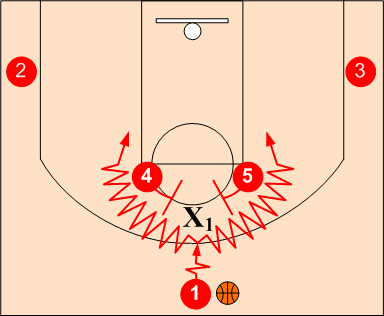
What to Discover or Recall . . .
The Horns offensive set is designed to better utilize basic Mid Screen/Roll action.
By deploying a second high post screener, it allows the ball handler the option of driving off a screen in either direction.
Having two screeners high also clears out any baseline defensive help on dribble penetration.
When the defense does try to help, it creates open outside shot opportunities for good spot up shooters.Recently, there has been a very large increase in the number of teams using the Horns offense. By deploying a second high post screener, it provides the ball handler the option of driving off a screen in either direction. Since screens are available on both sides, unlike it's cousins the Mid Screen and Side Screen, the Horns offense cannot be disrupted by simply influencing the ball handler away from the screen.
With both screeners high, all Off-Ball defenders are in first pass denials making it very difficult to help out against dribble penetration. Because of its 1-4 high alignment, Horns is an excellent offense to deploy against pressure defenses.
| Overview | Ball Reversal | Basic Reads | Variations | Installing | Game Strategy | Case for Defense |
Offensive Fundamentals Required
Schematic Sequence

Phase 1: Dribble Penetration
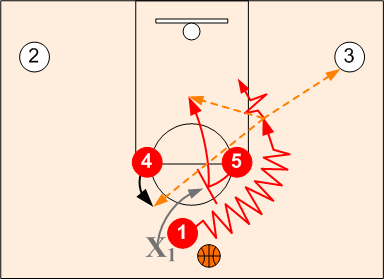
The basic option of the Horns or "V" offense is for the point O1 to drive off a high post screen. The high post sets an On Ball screen to free up the point guard for dribble penetration.
The dribbler has the options of:
- Turning the corner for a drive to the basket.
- Executing a pull up jumper if the defense goes below the screen.
- Making a return pass to the post cutting away to the basket after the screen if the defense switches.
- Or making a kick out passes to the shooters spotting up on the wings.
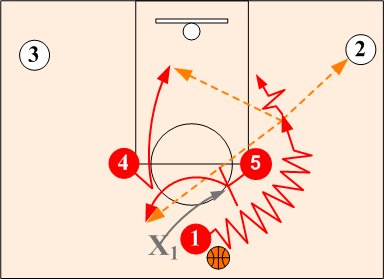
Note: When the screener rolls to the basket, the "off" screener then goes opposite and pops out. If the screener pops out after the screen, the "off screener cuts away to the basket.
Phase 2: Ball Reversal
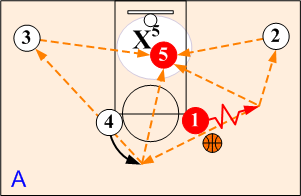
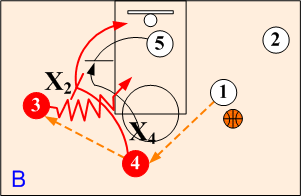
Post Isolation
When the screen and roll action does not produce a good shot, O1, O2, O3 and O4 looks to feed O5 posting up strong in the low post area.
Side Screen
O4 passes to O3 on wing and sets an ON Ball screen. O3 drives over O4's screen initiating screen and roll action. O5 sets a back screen for O4 rolling to basket. O1 and O2 spot up.


Basic Reads & Counters
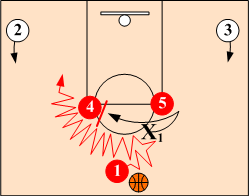
The keys to the success of the Horns high post screen action is in execution and coordination. The ballhandler and screener have to think and function as one unit. This requires proper footwork, timing, non-verbal communication, and experience. Players should be prepared to recognize and attack the following situations:
Mid Screen Reads & Counters: What if the defense . . .
Click on the desired read to view illustrated counter option
Read: Defensive players CHASES over the screen.
Counter: Point Drive
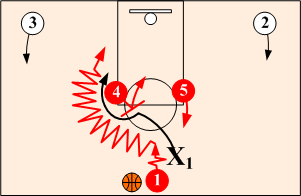
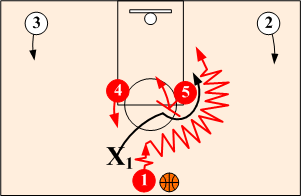
When defensive players X1 chases over the screen, O1 turns the corner on dribble and drives hard to the basket.
Read: Defensive payer SAGS OFF shooter to help on drive.
Counter: Kick Out Pass
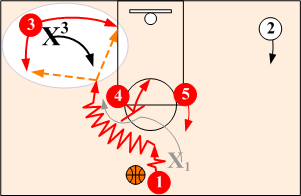
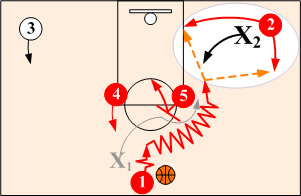
If baseline defender X2 or X3 drop off to help out on O1's dribble penetration, O1 makes a kick out pass to O2 or O3 spotting up for open shot.
Read: Defensive players goes UNDER the screen.
Counter: Pull Up Jumper
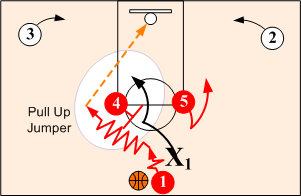
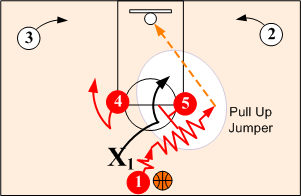
When defensive player X1 goes under O5's screen, O1 pulls up for an open jump shot.
Read: Defensive players SWITCH on the screen.
Counter: Post Roll
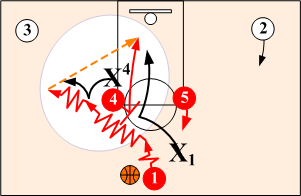
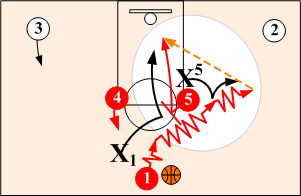
When defensive players X1 and X5 switch on screen, O1 looks to feed the screener O5 rolling to the basket or posting up against the smaller defensive guard.
Read: Smaller defensive player matched up inside against post.
Post Mismatch Option
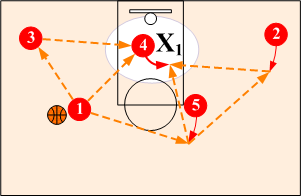
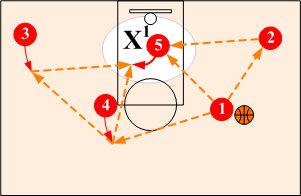
When O5 has a mismatch advantage against smaller O1, O5 posts up looking for a feed from any on the peripheral players.
Read: Big defensive player matched up outside against point guard.
Point Mismatch Option
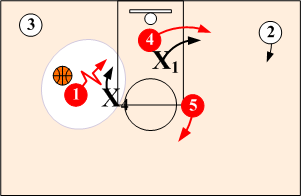
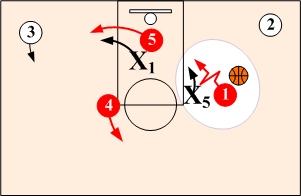
Against the defensive switch, when ball handler O1 has a definite advantage over bigger X5, screener O5 clears out allowing point to go one on one against X5. If/when point's shot is not available, post can then dive to the basket to exploit smaller X1.
CAUTION
If the defensive wing should drop off to help, point should make a kick out pass to wing spotting up for three point shot. If the baseline defensive player should step out to help, the point can make a drop pass into the low post.
Read: Defensive players ANTICIPATE switch and zone.
Counter: Post Slip
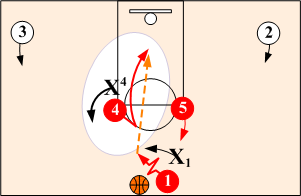
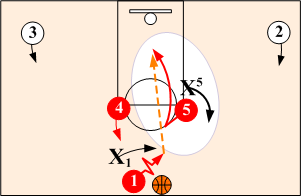
When defensive players X1 and X5 anticipate the switch and zone, high post should fake the screen and slip (cut away) to basket for shot.
Read: Defensive players SHOW & RECOVER against the screen.
Counter(1): String Out & Post Roll
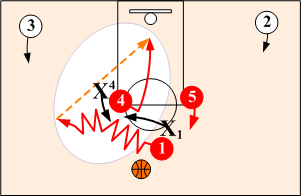
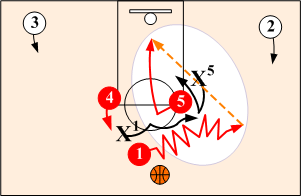
When defensive players X1 and X5 try to show and recover against the screen, O1 strings out defender X5 with dribble. O5 rolls to basket looking for pass from O1. If defender X4 moves across to guard O5, then O5 pops and O4 cuts to the basket.
Caution
If defender X5 is in foul trouble, X1 should drive hard to the basket looking to draw a foul.
Counter (2): String Out & Post Pop Option
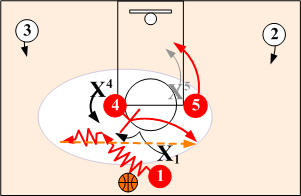
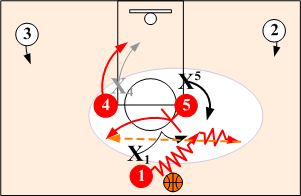
When screener O5 is a good outside shooter, O5 has the option of popping out against the show and recover defense instead of rolling to the basket. If O5 pops O4 goes opposite and dives to the basket. Defender X5 will have a hard time recovering against O5.
Read: Defender CHEATS OVER the screen early.
Drive Opposite
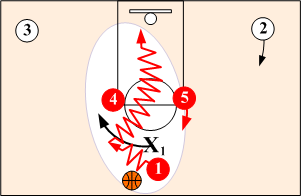
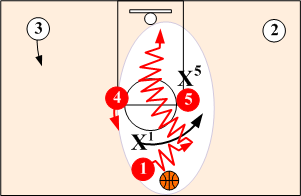
When the On-Ball defender anticipates the side screen and CHEATS OVER early, the ballhandler should drive opposite to the basket. In changing direction to drive opposite, the ball handler can use a front crossover, a behind the back, or a reverse between the legs dribble. In reversing direction, the ballhandler also has the option of driving off the weakside screener rather than to the basket.
Read: Defender overplays a post.
Post Lob Pass
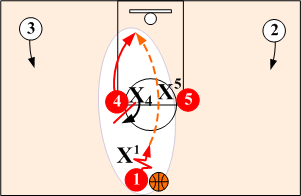
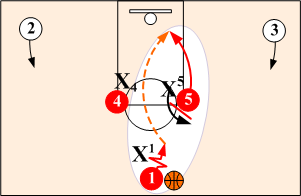
If either screener's defender overplays to deny or disrupt the screen, the screener back cuts to the basket looking for a lob pass.
Read: Defensive players TRAP on the screen.
Counter(1): String Out & Post Roll
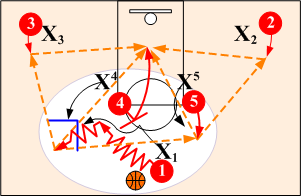
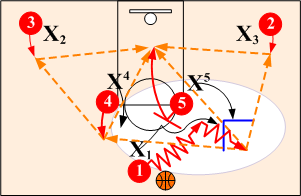
When defensive players X1 and X5 double teams O1 on screen, O1 should immediately string out (spread) the double team with dribble while 05 rolls to basket. O1 can pass directly to O5 or to any of the peripheral players for feed to O5. Ball must be moved in the air against the trap with sharp passes (no dribbling).
Counter(2): String Out & Post Pop
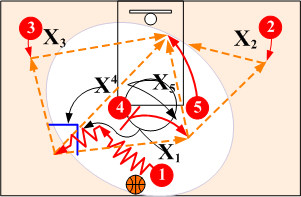
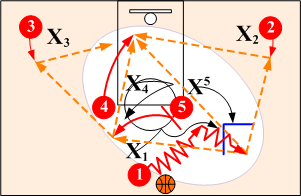
When defensive player X4 moves across to guard O5 on double team, O5 pops out and O4 cuts to basket forming a 2-1-2 alignment. O1 can pass directly to O4 or to any of the peripheral players for feed to O4.

Horns Variations
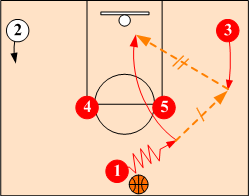
Various NBA teams have adapted the Horns' twin mid screen action to take advantage of their specific player personnel. The Horn's alignment readily allows for a host of very successful variations that takes full advantage of specific player personnel. Some of these more frequently used variations include Loop, Base Split, Picked Fence, Twin Sides, High Post Rub, and Hand Back Lob.
Click the View button below to see variations of the Horn's Offense.

| HP Rub | Flex | Twin Sides | Loop | Base Split | Fence | Hand Back |
High Post Rub
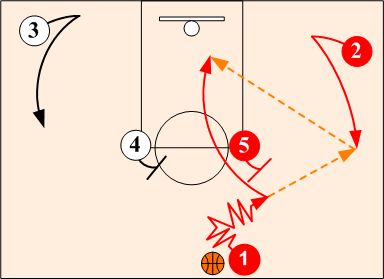
Point O1 makes an entry pass to wing O2 and cuts to basket off O5's high post back screen. O2 looks to make a lob pass to O1 if available.
High Post O5 after setting back screen for O1, initiates steps out for a reversal pass from O2. O2 then down screens for O1 and O4 down screens for O3 on the weakside.
Down Screens
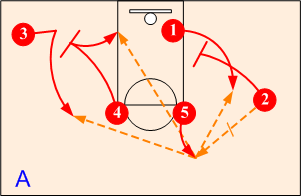
High Post O5 after setting back screen for O1, initiates steps out for a reversal pass from O2. O2 then down screens for O1 and O4 down screens for O3 on the weakside.
Side Screen
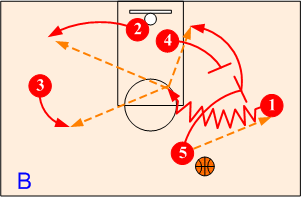
O5 initiates side screen action by passing to O1 coming off O2's down screen and setting a side screen. O2 and O3 spot up for three point shots on weakside. O4 sets a back pick for O5 rolling to the basket.
Flex
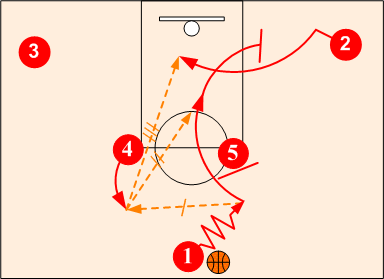
Ballhandler passes to weakside post O4 stepping out and makes a high post rub cut off O5. O4 looks to feed O1 on basket cut. If not open O1 continues and sets a base screen for O2 initiating flex action.
Down Screen
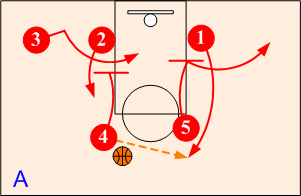
O5 sets sets a down screen for O1 and clears to the corner. O4 passes to O1 and down screens for O2. O1 looks to feed O3 coming off O2's base screen or to O2 popping out off O4's down screen.
Continuity
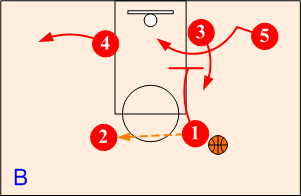
Flex action continues with O1 passing to O2. O5 rubs off O3's base screen as O4 clears to corner. O1 then down screens for O3.
Twin Side Screens
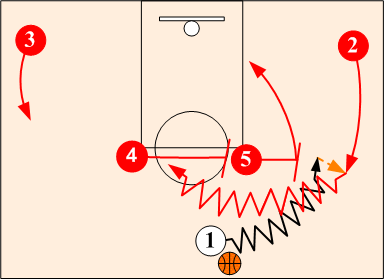
Ballhandler O1 executes a dribble hand-off with wing O2. O2 then dibble penetrates off O5's and O4's double side screens. Weakside wing O2 spots up.
Post Roll
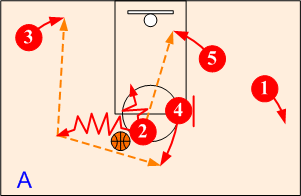
If the defense switches, O2 looks to feed O5 rolling to the basket or posting up strong. O2 also has the option of passing to O3 spotting up or back cutting to the basket when their defender overplays. Post O4 pops out.
Side Screen Action
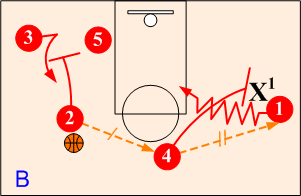
If a good shot is not available off the drive, O2 makes a reversal pass to O4, who in turn passes to and sets a side screen for O1. O2 sets a down screen for O3 on weak side.
Loop Entry
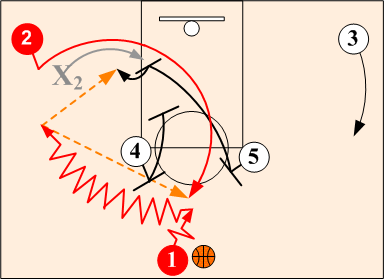
Point O1 drives wide off O4's screen as 02 back cuts to basket. O5 and O4 rolls down and sets a tandem double screen for shooter O2 looping out to the top of the circle. O1 has option passing out to shooter O2 or feeding O5 posting up.
Ball Reversal
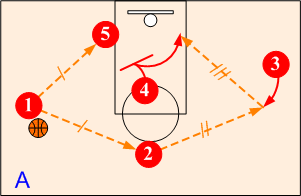
O1 looks to feed O5 posting up strong or to make a reversal pass out to O2. O2 in turn passes to O3 who looks to feed O4 posting up off down screen.
Inside Triangle Game
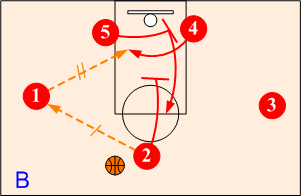
O2 also can make a return pass to O1 and initiate the inside triangle game motion. O5 sets a base screen for O4 and O2 sets a down screen for O5.
Weakside Split Variation
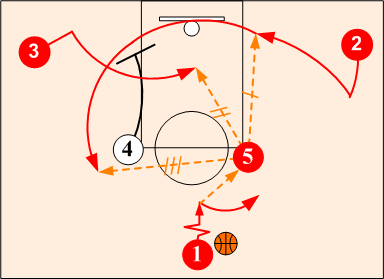
Ball handler O1 passes to post O5 and cuts off O5 as O2 back cuts to the basket. Weakside post O4 rolls down to low post area. O5 looks to feed O2 on back cut or O1 on two person game. If an open shot is not available, O5 thens looks to pass to either O3 cutting over O4 or to pass to O2 continuing out off low post O4 for shot.
Inside Triangle
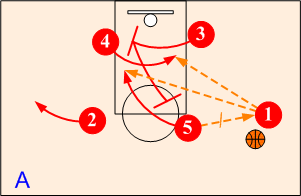
O5 passes to O1 on wing initiating inside triangle action. O3 sets a base screen for O4 and steps up and sets a back screen for O5. O1 looks to feed O4 posting up or to lob to O5 going off O3's back screen.
Ball Reversal
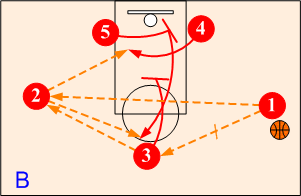
Ballhandler O1 makes a reversal pass out to O3 who in turns passes to O2 or can make a skip pass directly across to O2. Post O5 sets a base screen for O4 and pops out off O3's down screen. O2 looks to feed O4 or O5.
Picket Fence
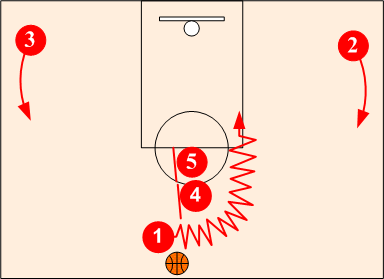
Similar to the movie "Hoosiers" posts O4 and O5 line up in tandem. Ballhandler O1 drives off the double screen while shooters O2 and O3 spot up.
Post Roll

If the defense switches, O2 looks to feed O5 rolling to the basket or posting up strong. O2 also has the option of passing to O3 spotting up or back cutting to the basket if their defender overplays. Post O4 pops out.
Side Screen Action

If a good shot is not available off the initial action, O2 makes a reversal pass to O4, who in turn passes to and sets a side screen for O1. O2 sets a down screen for O3 on weak side.
Hand Back Lob
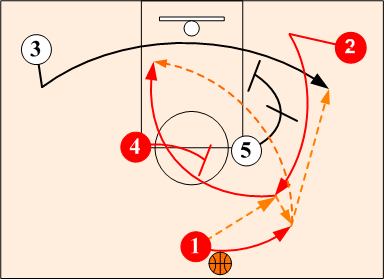
The hand-back lob is an variation of the old NBA "Chicago" play. It was used very effectively by Argentina in their upset win over the United States Dream Team in the 2002 world championships.
Point O1 passes to O2 coming off O5's down screen. O1 follows the pass and receives a hand-back from O2. Post O5 continues and sets a baseline screen for shooter O3 clearing out the weakside. Post O4 then steps up and sets a back screen for O2. O2 cuts to basket off O4 looking for return lob pass from O1. O1 looks to pass to O3 or O2.
Motion
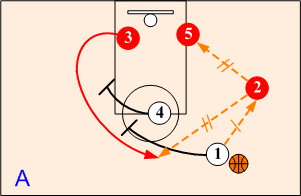
When O1 passes to O2 coming off O5's base screen, O2 looks for shot or feed inside to O5. When the defense switches, O3 looks to feed O5 posting up against the smaller defender. O1 and O4 screen away for O3.
Mid Screen Action
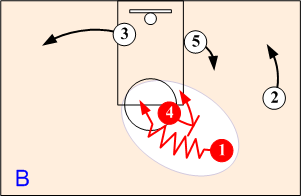
If shooter O1 does not pass to O2, O4 steps out and sets a mid screen for O1. O1 drives off O4's mid screen initiating screen and roll action.

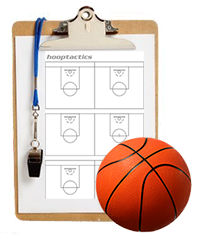
Installing the Horns Offense
The key to the success of the Horns Offense is in its execution and coordination. Players need to be well prepared to execute mid screens and down screens. The ballhandler, screener and receiver have to think and function as one unit. This requires proper footwork, timing, non-verbal communication, and experience.
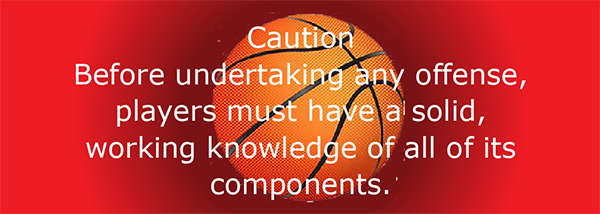
Horns Breakdown Drills:
 Two Player Entries Drill (2-on-2)
Two Player Entries Drill (2-on-2)The Game Within a Game
Individual offensive skill development and improvement should be an integral part of every practice. In addition to early time (before practice) work, each player should, personally, have one or two individual fundamental techniques to work on during the course of a practice. The specific skill or skills will vary from player to player and can be assigned by the coaching staff or determined by the players themselves. As a reminder, the skill(s) should be written down on a 3 X 5 card and give it to each player prior to practice.

Game Strategies
Scout your opponent. Players need to know what reads to expect during the game. Opponents will generally use only a primary and secondary defense technique in defending side screens. Educate and explain the anticipated reads and their counters. When scouting is not possible, scout your opponent during the game.
Don't be a spectator and watch the ball during the game. Be conscience and alert to any defensive changes or adjustments, especially after substitutions and timeouts. Don't hesitate in deploying various alignments and entries during the game so that defenders cannot focus on defending just one set. Move players around and attack the weakest defenders.

The Case for the Defense
Even if you do not plan to use the Horns Offense, you better be prepared to defend against it. It is one of the most used offenses in the game.
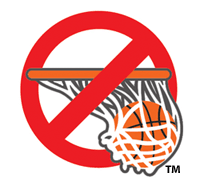
Continue and learn proven ways and techniques to disrupt the Horns Offense
Return to Set Offenses - Click Here
Return to Offensive Strategies - Click Here
Return to HoopTactics - Click Here
© 2026 HoopTactics All Rights Reserved.

